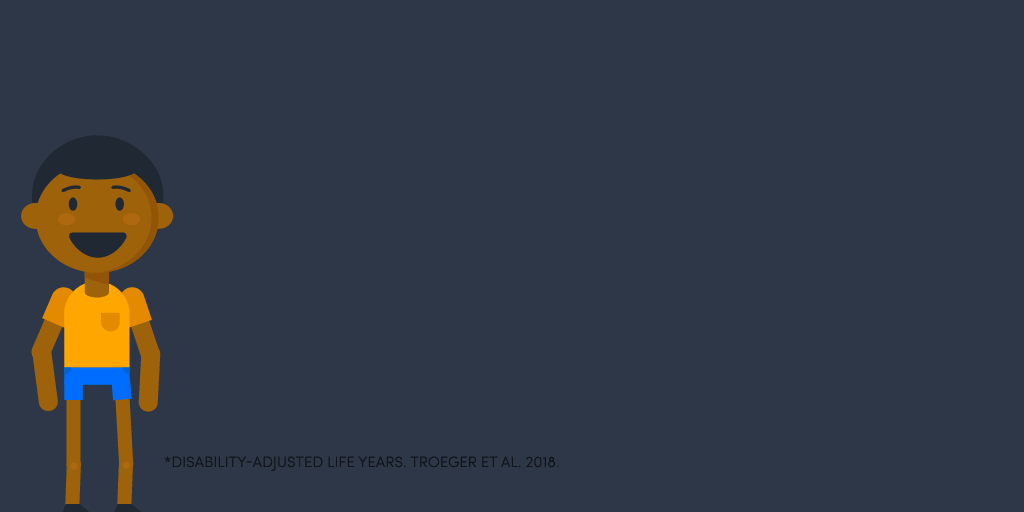Diarrheal disease is particularly dangerous in poor communities and places where safe water, sanitation, and access to basic medical care may be limited or unavailable.
The state of the field is changing: death is not the only problem or biggest threat.
In many cases, diarrhea has debilitating, long-term consequences. Repeated illnesses in children contribute to a vicious cycle of malnutrition and infections, causing irreversible damage—such as physical stunting and deficiencies in cognitive development.
Diarrhea limits potential for children, their families, and entire communities, keeping them locked in poverty. But proven solutions hold vast potential for addressing this resilient threat. The Global Action Plan for Pneumonia and Diarrheal Disease (GAPPD) sets targets for progress in the highest burden countries. Keep track of progress with the annual report card.
Diarrhea robs children of their life potential and perpetuates inequities. We need to intensify our commitment to research and primary health care approaches that encompass prevention and treatment efforts for diarrheal disease – in the community, the home, and in the clinic.
- Miren Iturriza-Gomara, Rotavirus vaccines initiative lead, PATH
Repeated diarrhea infections are holding children back from reaching their full potential.
Children living in poverty are subjected to an onslaught of environmental pathogens every day. These pathogens cause diarrhea and other asymptomatic infections, leading to chronic gut inflammation and putting children at risk of future infections and malnutrition.

Diarrhea is also expensive. When a family has to spend its savings on emergency medical treatment and travel logistics to get that treatment, the family will have less money for other essentials like food, rent, or education. Additionally, when a caretaker has to take time off work to care for a sick child, they may lose wages or business opportunities. All these contribute to the vicious cycle of ill health and poverty.
We know how to solve the problem.
The trends in recent years include both progress and persisting inequities alike. Deaths from diarrhea declined from more than 1 million among children under five years in 1990 to less than 450,000 in 2022. Yet children in poor communities bear the brunt of the remaining burden, and too many surviving children are held back because of persistent, repeated infections.
Diarrhea is not a new issue and remains a chronic problem in low- and middle-income countries; it is one of many menacing health threats competing for attention and funding.
We need to change the conversation from surviving to thriving.
Urge:
advocates, scientists, academics, researchers, donors, multilaterals, and national government leaders...
To:
prioritize diarrheal disease and stop the cycle of poor health and poverty...
By:
increasing awareness, making solutions available to everyone who needs them, and establishing diarrhea’s long-term consequences as an urgent priority.
Stop the cycle:
Give every child a healthy start.
The Defeat Diarrheal Disease (DefeatDD) Initiative is a PATH project.
For children in poor communities, diarrhea remains a major cause of death and can lead to lasting consequences. Simple and proven tools can prevent and treat diarrhea, and integrating them achieves the greatest impact. By joining these tools and our voices together, we can protect children everywhere from diarrheal disease.
This report will be regularly updated.
The report that follows is a comprehensive resource with the latest research and evidence on diarrheal disease and the solutions available to prevent and control it. It will be regularly updated as new information emerges. It is intended to be used by advocates (including scientists, academics, and researchers), donors, multilaterals, and national government leaders to take action and join the movement to defeat diarrheal disease.
Continue to The ChallengeFurther Reading:
- Child Health Spotlights (Pneumonia & Diarrhea).
- Countdown to 2030. A Decade of Tracking Progress for Maternal, Newborn and Child Survival: The 2017 Report.
- DefeatDD infographic. Why is diarrhea dangerous?
- DefeatDD.
- DefeatDD. An impossible choice: the dangerous disruption of diarrhea treatment costs.
- DefeatDD. DefeatDD campaigns.
- DefeatDD. How we measure the true impact of diarrheal disease.
- DefeatDD’s new infographic on gut damage makes environmental enteropathy digestible.
- Demographic and Health Surveys. Child Health.
- Every Woman Every Child Report.
- IHME. Global Burden of Disease.
- IHME. Mapping geographical inequalities in childhood diarrhoeal morbidity and mortality in low-income and middle-income countries, 2000–17: analysis for the Global Burden of Disease Study 2017.
- IGME. UN Inter-agency Group for Child Mortality Estimation. 2022.
- Thousand Days. The Impact of Poor Sanitation on Nutrition.
- UNICEF/World Health Organization. Ending preventable child deaths from pneumonia and diarrhoea by 2025: The integrated global action plan for pneumonia and diarrhoea (GAPPD).
- UNICEF: Diarrhoea
- United Nations. Sustainable Development Goals.
- World Health Organization. Diarrhoeal disease.
- World Health Organization. Global Strategy for Women's, Children's and Adolescent's Health 2016-2030.



 What is the global burden?
What is the global burden?